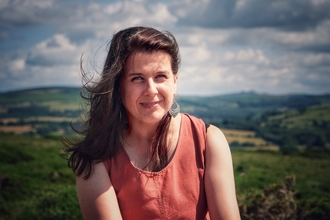Welcome to our ‘Reading Rivers’ series, where we’ll be exploring how our waterways inspire the written word! Today we’re looking at Waterlog by legendary author Roger Deakin – for many, a quintessential piece of British nature writing. First published in 1999, it documents an epic 12-month quest to swim in Britain’s water bodies.
The book begins with Deakin at home in rural Suffolk, leaping into his moat to evade a rainstorm, then follows him on rambles across stream, sea, loch, and fen. What unfolds is a meandering exploration of two connected landscapes: Britain, and the mysterious realm of Deakin’s mind. Hampshire gets a whole chapter – a visit to Stockbridge for a dip in the River Test.
The Wash, Fens, and other locations are depicted in flashes of brilliant detail: the frosting of salt on sea lavender, braids of water buttercup in a mill race, mist rising from a sunlight meadow, rainbow spray atop a tidal pool. The baths, lidos, and open-air swimming pools are less lovingly drawn, appreciated more for the community benefits they provide.
As you would expect for a book about literally immersing yourself in nature, Waterlog is full of wildlife sightings. Deakin is thrilled to encounter water voles, brown trout, and kingfishers. Smaller species, like damselflies, are equally cherished. We see scenes through the eyes of a buzzard wheeling overhead, or an otter slinking through the undergrowth. Deakin often pictures himself as one of them, curling in his sleeping bag “like a caddisfly larva”.
This rapport with the wild gives rise to some sweetly empathetic moments. Delight at meeting an otter is tempered by guilt for invading its territory. Weed pulled from the moat is carefully combed for trapped creatures. A dive is halted by thoughts of disturbing the water’s ecosystem. At home, the pheasant that calls in the night is considered a neighbour, and the swallow migration causes months of restless worry.
Deakin tends to anthropomorphise these animals, sometimes even elevating them to mythical status. Under his gaze, an otter is a friendly water spirit and a bankside tree is the mighty Ygdrasil. As he roams the landscape, he imagines it filled with dragons, afancs, naiads, and mermaids. Nature receives an appreciation bordering on reverence – though he longs for company when his friends are absent, there is something spiritual in his solitude.
This idea is most apparent when Deakin peers into a holy well or plunges into the surf, pondering the kinds of transcendence that water offers us. In his experience, interacting with it can be truly transformative; a cure for everything from boredom to depression. Birth and rebirth are recurring themes: narrowly escaping death in an underground cave system – a “magical uterus” – is framed as almost aspirational.
For Deakin, crossing the line of the seashore, riverbank, or pool edge is a way of “getting under the skin of things”. To him, wild swimming is an inherently subversive activity, attracting those who seek to escape confinement. Swimming lengths is compared to a tiger pacing in a cage; even gravity imposes a kind of “tyranny”. When he evades a group of birdwatchers, or argues about trespassing with a river keeper, his rebellious joy bursts from the page.
It makes sense, then, that many of the book’s more sombre passages are about a feeling of constraint or separation. Deakin confronts issues like abstraction, invasive species, and pollution, but seeing part of the River Lark encased in concrete - “impossibly remote and fenced” – brings him to tears. An understandable reaction from someone who describes wearing a wetsuit as “against nature and something of a killjoy”.
Early on, Deakin expresses his desire for a life more instinctive and feral than his own. He envies the otter, dolphin, and whale for their apparently easy enjoyment of things. Only leaving the world of labels and signposts, he argues, will allow him to revel in nature’s mysteries. Which begs the question: if we want to connect with the natural world, do we have to disconnect from the human one?
Overall, Waterlog is a gentle and philosophical book stuffed with interesting anecdotes and compelling imagery. You can borrow printed and e-book copies from your local Hampshire library, so grab your free library card today! If you love reading about rivers, check out our Tales from the Riverbank project. This project is part of the Watercress and Winterbournes scheme.


